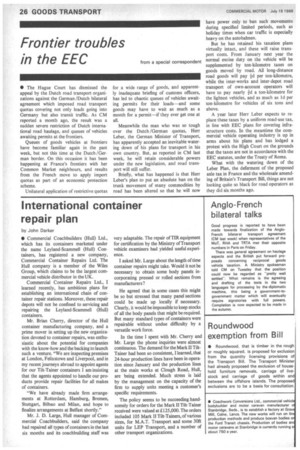International container repair plan
Page 28

If you've noticed an error in this article please click here to report it so we can fix it.
by John Darker • Commercial Coachbuilders (Hull) Ltd., which has its containers marketed under the name Leyland-Scammell (Hull) Containers, has registered a new company, Commercial Container Repairs Ltd. The Hull company is a member of the Wiles Group, which claims to be the largest commercial vehicle distributor in the UK.
Commercial Container Repairs Ltd., I learned recently, has ambitious plans for establishing an international chain of container repair stations. Moreover, these repair depots will not be confined to servicing and repairing the Leyland-Scammell (Hull) containers.
Mr. Brian Cherry, director of the Hull container manufacturing company, and a prime mover in setting up the new organization devoted to container repairs, was enthusiastic about the potential for companies with the know-how and the backing to launch such a venture. "We are inspecting premises at London, Felixstowe and Liverpool, and in my recent journeys abroad to appoint agents for our Tilt-Tainer containers I am insisting that the agents appointed to handle our products provide repair facilities for all makes of containers.
"We have already made firm arrangements at Rotterdam, Hamburg, Bremen, Stuttgart, Bilbao and Milan, and hope to finalize arrangements at Belfast shortly."
Mr. J. D. Large, Hull manager of Commercial Coachbuilders, said the company had repaired all types of containers in the last six months and its coachbuilding staff was very adaptable. The repair of TIR equipment for certification by the Ministry of Transport vehicle examiners had yielded useful experience.
I asked Mr. Large about the length of time container repairs might take. Would it not be necessary to obtain some body panels incorporating pressed or rolled sections from manufacturers?
He agreed that in some cases this might be so but stressed that many panel sections could be made up locally if necessary. Clearly, it would be impossible to keep stocks of all the body panels that might be required But many standard types of containers were repairable without undue difficulty by a versatile work force.
In the time I spent with Mr. Cherry and Mr. Large the phone inquiries were almost continuous. The demand for the Mark II TiltTainer had been so consistent, I learned, that 24-hour production lines have been in operation since January and the production lines at the main works at Clough Road, Hull, are being extended. Much stress is laid by the management on the capacity of the firm to supply units meeting a customer's specific requirements.
The policy seems to be succeeding handsomely for orders for the Mark Tilt-Tahier received were valued at £.125,000. The orders included 105 Mark II Tilt-Tainers, of various sizes, for M.A.T. Transport and some 30ft units for LEP Transport, and a number of other transport organizations.




















































































































